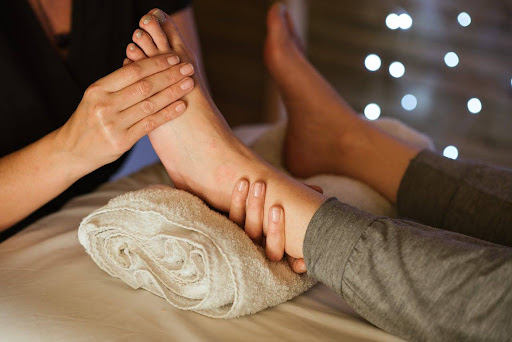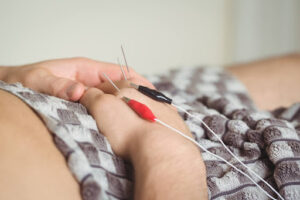Beyond Tension: Unlocking Tranquility with Acupuncture

In today’s paced and often stress filled modern life many individuals find themselves grappling with the burdens of anxiety. While there are approaches to manage this pervasive condition one ancient practice has emerged as a holistic and natural solution. Acupuncture. Originating from medicine, acupuncture involves the gentle insertion of thin needles into precise points on the body to restore balance and promote overall well being.
This article explores the realm of acupuncture in easing anxiety by delving into its principles, mechanisms and the growing body of evidence that supports its effectiveness.

The Pillars of Acupuncture: A Holistic Outlook
Balancing Life Energy: Qi and Harmonizing Its Flow
At the heart of acupuncture lies the concept of Qi (pronounced “chee”). A life force that flows through pathways known as meridians within our bodies. According to medicine (TCM) disturbances or imbalances in Qis flow can manifest as physical or emotional ailments. The aim of acupuncture is to reinstate harmony by stimulating points, along these meridians thereby facilitating the flow of vital energy.
Understanding Meridians
Within TCM the meridian system comprises twelve channels, each intricately linked to organs and bodily functions.
Acupuncturists believe that by targeting points along the body’s meridians they can influence the corresponding organs and regulate the flow of Qi. When it comes to anxiety they often focus on points associated with the heart, liver and spleen meridians to address both the emotional aspects of this condition.
A Whole-Body Approach
Unlike medicine, which tends to treat symptoms, acupuncture takes a holistic approach. Practitioners view the body as an interconnected system where physical, mental and emotional well being are intertwined. The aim is to tackle the root causes of anxiety and promote balance, for lasting relief.
One mechanism through which acupuncture for anxiety is by regulating neurotransmitters in the brain. These chemical messengers like serotonin and dopamine play a role in mood regulation. By stimulating acupuncture points it is believed that production of these neurotransmitters can be enhanced, leading to feelings of calmness and well being.

The Mechanisms of Acupuncture in Anxiety Relief
Another way acupuncture helps alleviate anxiety is, through the release of endorphins. Endorphins are painkillers and mood boosters produced by our bodies. The insertion of acupuncture needles can trigger their release contributing to reduced anxiety levels and an overall sense of relaxation.
Regulation of the Autonomic Nervous System
The system (ANS) plays a crucial role in how our body responds to stress. Acupuncture has been discovered to have an impact on the ANS by influencing the balance between the branch (known as fight or flight) and the parasympathetic branch (known as rest and digest). This influence helps shift our body into a state counteracting the physical effects of chronic stress.
Managing Cortisol Levels
When experiencing stress and anxiety cortisol levels tend to rise which can lead to health problems. Research indicates that acupuncture may assist in regulating cortisol levels reducing the impact of prolonged stress on both our mental well being.
Acupuncture Techniques for Easing Anxiety
Heart 7 (Shen Men)
Positioned on the wrist Heart 7 is recognized as an acupuncture point for calming the mind and promoting well being. Acupuncturists often target this point to alleviate symptoms associated with anxiety and insomnia.
Liver 3 (Tai Chong)
Situated on top of the foot, Liver 3 is known for its role in facilitating Qi flow and addressing imbalances. Stimulating this point is believed to relieve feelings of stress, frustration and irritability.
Spleen 6 (San Yin Jiao)
Located on the leg Spleen 6 is associated with both spleen and liver meridians.
Acupuncturists often utilize this point to nourish the blood, regulate the flow of energy (Qi) and address symptoms, like anxiety, sleeplessness and digestive problems.
Pericardium 6 (Nei Guan)
Positioned on the part of the forearm Pericardium 6 is well known for its ability to calm the mind. It is frequently used to alleviate symptoms such as anxiety, queasiness and difficulty sleeping.
Kidney 3 (Tai Xi)
Located on the ankle region Kidney 3 is associated with grounding and calming effects on the mind. Acupuncturists may select this point to help manage anxiety and promote a sense of equilibrium.
Research and Clinical Evidence
Meta-Analyses and Systematic Reviews
A growing body of research supports acupuncture’s effectiveness in reducing anxiety symptoms. Analyses and systematic reviews have analyzed findings from studies indicating that acupuncture can be an effective complementary therapy for individuals with anxiety disorders.
Comparative Studies
Studies comparing acupuncture with treatments for anxiety, such as medication or psychotherapy have been conducted. Some studies suggest that acupuncture may be equally effective as interventions but with side effects.
Neuroimaging Studies
Advancements in neuroimaging techniques have enabled researchers to investigate how acupuncture affects anxiety at a level.
Functional magnetic resonance imaging (fMRI) studies have discovered that acupuncture sessions lead to changes in brain regions associated with regulation and stress response.
Patient Feedback
Numerous studies have included patient feedback capturing the experiences of individuals who undergo acupuncture for anxiety. Positive testimonials and self reported reductions in anxiety symptoms contribute to the growing evidence that supports the effectiveness of acupuncture.
Incorporating Acupuncture into a Holistic Wellness Plan
Collaboration with Conventional Treatments
Acupuncture is often seen as a therapy that can be integrated with treatments for anxiety. Collaborative efforts between acupuncturists and healthcare providers allow for a personalized approach to health.
Modifications to Lifestyle
Acupuncture practitioners may offer guidance on lifestyle modifications to enhance the effectiveness of treatment. This could involve suggestions for stress management techniques, dietary adjustments and mindfulness practices aimed at supporting well being.
Mind Body Practices
By combining acupuncture with mind body practices like yoga or meditation a synergistic approach to relieving anxiety can be achieved. These practices work together harmoniously to address both the psychological aspects of anxiety.
Consistent Acupuncture Sessions
Consistency often plays a role in experiencing the benefits of acupuncture, for anxiety relief.Regular therapy sessions during times of increased stress can have an effect that promotes a lasting feeling of calmness and equilibrium.
The Holistic Impact of Acupuncture
Emotional Resilience
Apart from alleviating symptoms acupuncture aims to boost resilience. By addressing the causes of anxiety and fostering balance within the body, acupuncture empowers individuals to navigate life’s challenges with emotional strength and stability.
Improvement in Sleep Quality
Anxiety often disrupts sleep patterns leading to a cycle of tiredness and heightened stress. Acupuncture’s influence on neurotransmitter regulation and relaxation promotion can result in sleep quality consequently supporting well being.
Heightened Mind Body Connection
Acupuncture encourages individuals to develop an awareness of their mind-body connection. By placing needles on points individuals may gain a deeper understanding of their own bodies and emotions fostering self awareness and mindfulness.
Important Considerations
It is important to note that individual responses to acupuncture can vary. Factors such as the severity of anxiety, overall health status and individual constitution all play a role in determining the effectiveness of treatment.
Consultation with Healthcare Professionals
Individuals considering acupuncture, for anxiety, should consult with their healthcare providers before proceeding.Acupuncture practitioners often collaborate with healthcare professionals to ensure a well coordinated approach to mental health.
When it comes to safety and sterilization it is crucial to choose a qualified acupuncturist. Acupuncture when practiced by trained professionals is generally considered safe with side effects.
Conclusion
In conclusion acupuncture offers a time honored and holistic pathway to relieve anxiety and achieve tranquility. It combines wisdom with research to address not only symptoms but also the interconnected aspects of physical, emotional and mental well being. Through acupuncture individuals can unlock the door to tranquility. Strive for a harmonious and balanced existence.



